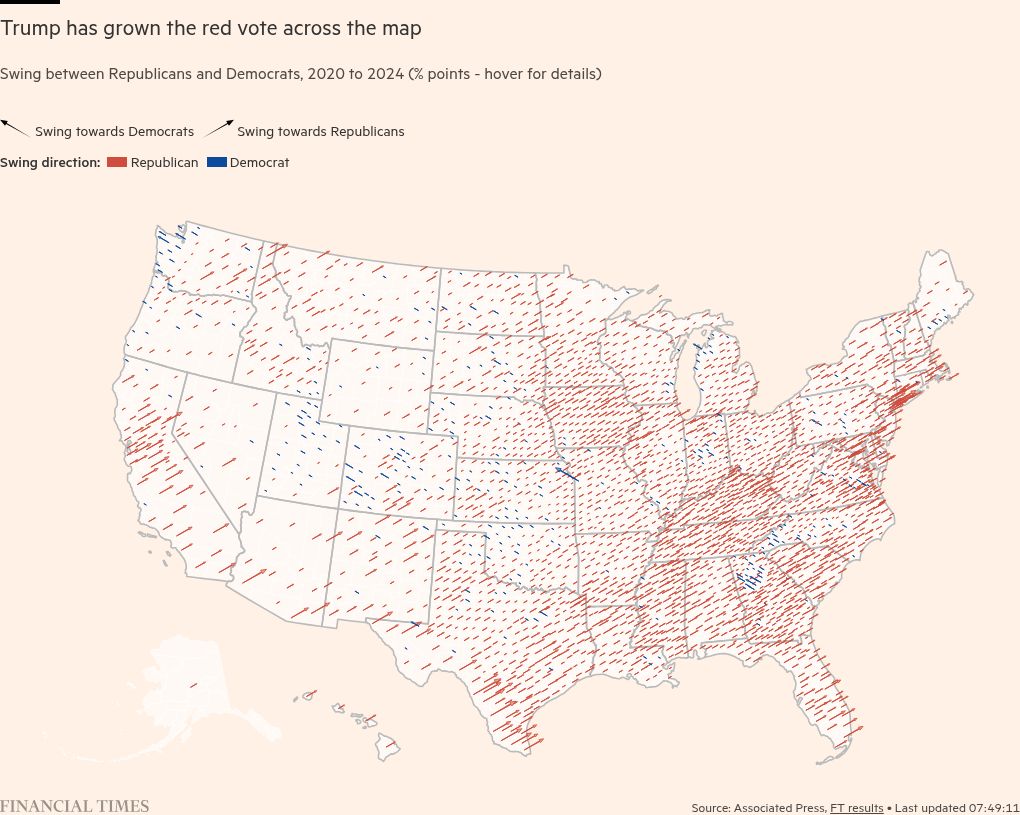
Unlock the White House Watch newsletter for free
Your guide to what the 2024 US election means for Washington and the world
As Kamala Harris campaigned through the battleground states in the final days of the presidential race, she closed each stump speech with a question for the crowd: “Are you ready to make your voices heard?”
The US electorate spoke resoundingly on Tuesday night — and the majority rejected what Harris was pitching.
In a historic win, Donald Trump not only clinched the 270 electoral college votes needed to win the White House but is on course to become the first Republican in 20 years to win the nationwide popular vote. His party also took back control of the US Senate and appeared on course to hold on to the House of Representatives.
Trump’s emphatic victory marked a repudiation of not just Harris but also her party’s progressive agenda and its failure to understand the concerns of the majority of US voters.
“If you were hard-eyed and realistic about this, you would say this was the worst outcome at the presidential level for Democrats in this century,” said Bob Shrum, a Democratic campaign veteran who worked on Al Gore and John Kerry’s bids for the White House. “The Democratic party is going to have to get its act together and move forward.”
Harris, a former prosecutor who first ran for president in the 2020 Democratic primaries as a progressive, tacked to the centre when she became her party’s candidate after Joe Biden stepped down following a disastrous debate against Trump in July. She vowed to be a president for “all Americans” and put “country over party”.
But the pitch fell flat, and Trump was able to rack up big wins across the country, even running up his numbers in traditionally “blue” Democrat-controlled states such as New York and California.
“The Democratic brand is pretty bad,” said Matt Bennett, co-founder of Third Way, a centrist Democratic think-tank. “The country has shifted pretty far to the right, and we were not aware of how deep the problem ran. The voters that we lost . . . looked at Democrats and said: ‘They don’t understand my life. I don’t want them representing me.’”

As they reeled from the election result on Wednesday, many in the party asked whether the Harris campaign had allowed Trump and the Republicans to paint them as too far left, or “woke”, on social issues.
The Trump campaign spent millions of dollars on political ads focusing on transgender issues in the final stretch of the race. “Kamala is for they/them,” one said. “Trump is for you.”
“The ads on the transgender stuff were really unsettling to people”, said Deb Dassow, chair of the Democratic party in Wisconsin’s Ozaukee County, a Republican stronghold in the Milwaukee suburbs that broke for Trump.
But others in the party said the Harris campaign simply failed to address the key concerns of voters on inflation and the cost of living.
“It was the economy first, second and third,” said leading Democratic pollster Jefrey Pollock. “How do you win when so many voters think that the country is on the wrong track? And when the voters say wrong track, they are really complaining about the economy.”
Many in the party believe that a shift to the middle is inevitable if it is to come back in the next presidential election.
“The only way to defeat rightwing populism is through the centre,” said Bennett. Shrum agreed that having “a moderately liberal, centre-left Democratic party is the only way forward if progressives actually want to win”.

But in a sign of disagreements on the horizon, Bernie Sanders, the 83-year-old progressive senator from Vermont who caucuses with Democrats, accused the party’s leaders of defending the “status quo” and said they should advocate for universal healthcare and ending US aid to Israel, among other leftwing policy changes.
“Will the big money interests and well-paid consultants who control the democratic party learn any real lessons from this disastrous campaign?” said Sanders. “Probably not.”
With the possibility of internecine party warfare on the horizon, several top Democrats cautioned against getting bogged down in ideological battles.
“It is a false choice,” said Pollock. “We shouldn’t be having an ideological debate. What we must do is connect with these voters who are clearly not responding to what we have been telling them.”
Others urged the party to look beyond the nation’s capital — and the existing leadership in the White House — for a path forward. The Democratic party still has several popular state governors, including in states that Trump won on Tuesday night. They include Josh Shapiro of Pennsylvania, Gretchen Whitmer of Michigan and Andy Beshear of Kentucky.
“How do we have an agenda that addresses what people want? How do we talk to them in a way that shows that we understand them and their values?” said Ken Baer, a Democratic strategist and adviser in Barack Obama’s White House. “That comes from outside of Washington.
“We need a generational change,” Baer added. “We have had a gerontocracy of 80-year-olds running the Democratic party since Obama left. We need new blood and new leaders.”
Additional reporting by Stefania Palma in Detroit and Oliver Roeder in New York